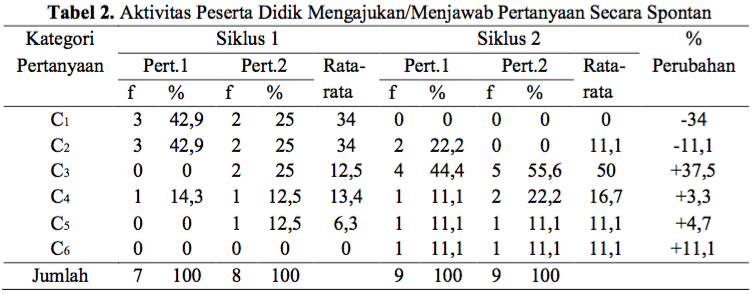
PENINGKATAN KEMAMPUAN BERFIKIR PESERTA DIDIK KELAS XI A5 SMA NEGERI 1 PEKANBARU MELALUI PENERAPAN MODEL PROBLEM-BASED LEARNING
Abstract
This research purpose is to assess and improve the thinking abilities of 11 grader of SMAN 1 Pekanbaru by using classroom-based action research. Problem-Based Learning Model has been used in thermochemistry section of Chemistry subject to improve learning ability. The thinking and learning ability data are directly collected from students’ worksheets (SWs) and observation of students’ spontaneous questions, the quality of that questions and also the quality of the answers when the teaching activities were held. The subject comprehension data are carefully taken from essay written test and SWs assessment. The results showed the improvement of students’ spontaneous questions and answers in C3 (+37,5%), C4 (+3,3%), C5 (+4,7%), C6 (+11,1%), but in C1 (-34%) and C2 (-11,1%) were found. In SWs, the improvements are showed in C3 (+21,7%), C4 (+2,9%), C5 (+7,1%), C6 (+12,8%), and degression in C1 (-44,3%) and C2 (-18,6%). In subject comprehension, for essay written test, improvements are showed in excellent (+11,4%) and very good (+14,3%) cetegories, whereas degression is showed in good (-2,9%), fine (-9,6%) and bad (-11,4%) categories. In subject comprehension, for SWs assessment, improvements are showed in excellent (+8,6%) and very good (+5,7%) categories, whereas degression in good (-11,4%), fine (-2,8%) categories. Fortunately there is no student in bad categories. The results showed that problem-based learning model can improve learning and thinking abilities of the students.
Keywords
Full Text:
PDFReferences
Astuti, S., Danial, M., Anwar. M. 2018. Pengembangan lkpd berbasis pbl (problem based learning) untuk meningkatkan keterampilan berpikir kritis peserta didik pada materi kesetimbangan kimia. Chemistry Education Review. 1(2): 90-114
Caesar, M.I.M., Jawawi, R., Matzin, R., Shahrill, M., Jaidin, J. H., Mundia, L. 2016. The Benefit of Adopting a Problem-Based Learning Approach on Students’ Learning Developments in Secondary Geography Lessons. International Education Studies. 9(2);51-65
Kemdikbud. 2015. Materi Pelatihan Implementasi Kurikulum 2013 Mata Pelajaran Kimia. Jakarta.
Kemmis, S. M. Taggart, R. 1992.The Action Research Planner. Victoria: Deaken University.
Mulyasa, E. 2015. Guru dalam Implementasi Kurikulum 2013. Bandung: PT Remaja Rosdakarya.
Muslimin.I. (2005). Asesmen Berkelanjutan. Unesa University Press. Surabaya.
Osman, K., & Kaur, S. J. 2014. Evaluating Biology Achievement Scores in an ICT Integrated PBL Environment. Eurasia Journal of Mathematics, Science & Technology Education, 10 (3), 185-194.
Sumarmi. 2012. Model Model Pembelajaran Geografi. Aditya Media Publishing: Yogyakarta
Wasonowati, R.R.T., Redjeki, T., Ariani, S.R.D. 2014. Penerapan model problem based learning (pbl) pada pembelajaran hukum - hukum dasar kimia ditinjau dari aktivitas dan hasil belajar siswa kelas x ipa sma negeri 2 surakarta tahun pelajaran 2013/2014. Jurnal Pendidikan Kimia. 3(3 ); 66 - 75
Widyatiningtyas, R., Kusumah, Y. S., Sumarmo, Utari., Sabandar, Jozua. 2015. The Impact of Problem-Based Learning Approach to Senior High School Students’ Matematics Critical Thinking Ability. IndoMS-JME, 6(2):30-38.
DOI: http://dx.doi.org/10.33578/jpk-unri.v5i2.7236
Refbacks
- There are currently no refbacks.

This work is licensed under a Creative Commons Attribution-ShareAlike 4.0 International License.

1.jpg)





